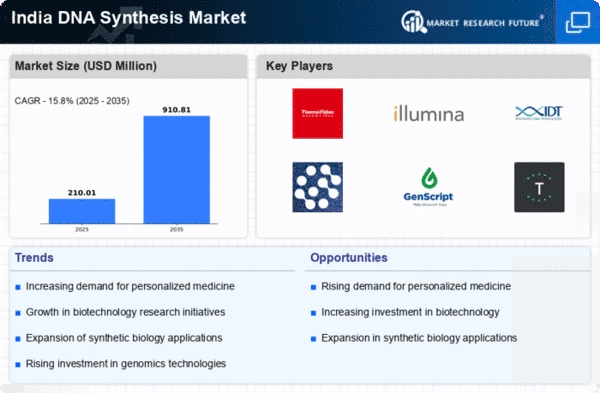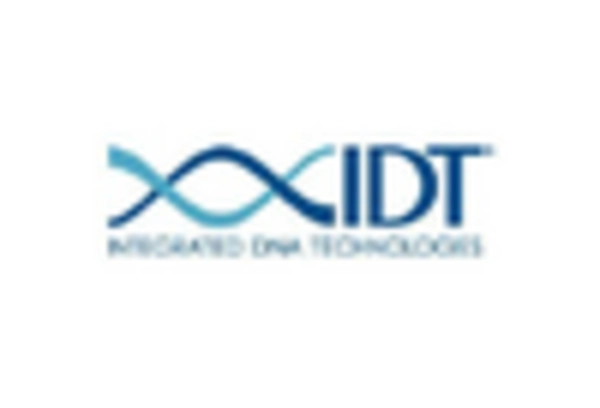Advancements in Biotechnology
The dna synthesis market in India is experiencing a surge due to rapid advancements in biotechnology. Innovations in gene editing technologies, such as CRISPR, are driving the demand for custom DNA synthesis services. As research institutions and biotech companies increasingly adopt these technologies, the need for high-quality synthetic DNA is becoming paramount. The Indian biotechnology sector is projected to reach $100 B by 2025, indicating a robust growth trajectory. This growth is likely to enhance the capabilities of local firms in the dna synthesis market, enabling them to offer more sophisticated and tailored solutions to researchers and developers. Furthermore, collaborations between academic institutions and industry players are fostering an environment conducive to innovation, thereby propelling the dna synthesis market forward.
Rising Applications in Agriculture
The application of synthetic DNA in agriculture is emerging as a significant driver for the dna synthesis market in India. With the increasing need for food security and sustainable agricultural practices, synthetic biology is being leveraged to develop genetically modified crops that are resistant to pests and diseases. The Indian agricultural biotechnology market is expected to reach $10 B by 2025, indicating a substantial opportunity for dna synthesis providers. This trend suggests that agricultural research institutions and companies will increasingly seek custom DNA synthesis services to create improved crop varieties. As the demand for sustainable agricultural solutions rises, the dna synthesis market is likely to benefit from increased collaborations with agricultural stakeholders.
Growing Investment in Genomic Research
Investment in genomic research is a key driver for the dna synthesis market in India. The government and private sectors are increasingly funding initiatives aimed at understanding genetic diseases and developing personalized medicine. In 2025, the Indian government allocated approximately $1 B to genomics research, reflecting a commitment to advancing healthcare through genetic insights. This influx of capital is likely to stimulate demand for synthetic DNA, as researchers require custom sequences for their studies. Additionally, the rise of startups focused on genomics is contributing to a competitive landscape, further driving innovation and efficiency in the dna synthesis market. As more projects emerge, the need for reliable and scalable DNA synthesis solutions will continue to grow.
Regulatory Support for Biotech Innovations
Regulatory frameworks in India are evolving to support innovations in biotechnology, which is positively impacting the dna synthesis market. The government is implementing policies that encourage research and development in synthetic biology, thereby creating a favorable environment for market growth. Initiatives such as the Biotechnology Industry Research Assistance Council (BIRAC) are providing funding and resources to startups and established companies alike. This regulatory support is likely to enhance the capabilities of firms in the dna synthesis market, allowing them to innovate and expand their service offerings. As regulations become more conducive to biotech advancements, the market is expected to witness increased activity and investment.
Collaboration Between Academia and Industry
The collaboration between academic institutions and industry players is a crucial driver for the dna synthesis market in India. Universities and research organizations are increasingly partnering with biotech companies to translate scientific discoveries into practical applications. This synergy is fostering innovation and accelerating the development of new technologies in dna synthesis. In 2025, it is estimated that over 60% of research projects in biotechnology will involve collaborations with industry, highlighting the importance of these partnerships. Such collaborations not only enhance the research capabilities of academic institutions but also provide industry players with access to cutting-edge research, thereby driving growth in the dna synthesis market.
















